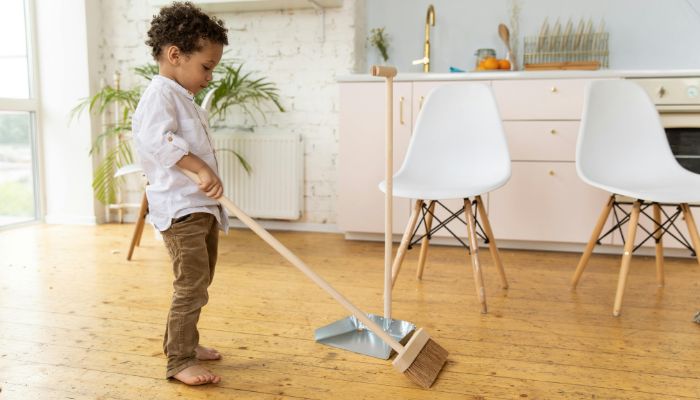
When we think of chores, we often associate them with older children or adults, but even toddlers as young as 3 years old can (and should) contribute to household tasks. Teaching children to help around the house at an early age is not just about lightening the load for parents—it’s about fostering independence, building self-esteem, and teaching valuable life skills.
For example, when I started encouraging my 3-year-old to help with small chores, I noticed their excitement when completing a task. That little “I did it!” moment filled them with pride. While it might take a bit of patience and some adjustments to make chores age-appropriate, the benefits are worth it—for both you and your child.
Why Chores Are Important for 3-Year-Olds
- Builds Responsibility
Even small chores help kids understand that they’re a valuable part of the family. When they contribute, they learn that maintaining a home is a shared effort. It sets the foundation for understanding that everyone has a role to play. - Fosters Independence
Completing simple tasks on their own, like putting away toys or setting napkins on the table, helps children feel capable and independent. These are the first steps toward becoming self-reliant as they grow. - Develops Motor Skills
Activities like wiping a surface, watering plants, or sorting laundry allow children to practice fine and gross motor skills while being productive. These everyday actions also improve hand-eye coordination and muscle control. - Encourages Patience and Focus
Learning to follow steps and complete tasks teaches kids the importance of patience and seeing things through to the end. This is especially valuable as it prepares them for school settings where attention and focus are key. - Boosts Confidence
There’s a sense of accomplishment in helping out. Even a simple “thank you” from a parent or sibling reinforces their confidence and makes them eager to do more. It’s amazing to see their pride when they realize they can make a meaningful contribution!
Age-Appropriate Chores for 3-Year-Olds
At 3 years old, kids can start with simple, manageable chores that match their abilities. Remember to demonstrate the task first, give lots of encouragement, and keep your expectations realistic.
Here are some age-appropriate chores:
- Picking Up Toys: Teach them to put their toys in baskets or bins. This is a simple task that also reinforces tidiness.
- Setting the Table: They can place napkins, unbreakable plates, and utensils on the table with supervision.
- Feeding Pets: Scoop food into a pet’s bowl with help. Kids love taking care of their furry friends!
- Sorting Laundry: Have them sort socks or separate light and dark clothes.
- Dusting: Give them a small cloth or a dusting mitt to wipe low surfaces like coffee tables or baseboards.
- Watering Plants: Use a small watering can to help with houseplants or outdoor flowers.
- Putting Away Groceries: Let them carry lightweight, non-breakable items (like cereal boxes or canned goods) to the pantry or fridge.
- Making Their Bed: While it won’t be perfect, encourage them to straighten pillows and pull up blankets.
- Cleaning Up Spills: Show them how to use a paper towel or small cloth to clean up minor messes they make.
- Organizing Shoes: Ask them to line up shoes neatly in the hallway or closet.
- Wiping Surfaces: Give them a damp cloth to wipe a table or countertop after a meal.
- Helping with Cooking: They can stir batter, wash fruits and veggies, or place ingredients in a bowl with supervision.
- Putting Clothes in a Hamper: Encourage them to toss dirty clothes into a hamper to reinforce daily habits.
- Carrying Mail: Let them bring the mail inside or help deliver letters to family members.
Chore Charts and Tools to Make Things Easier
Having the right tools and visuals can make chore time more enjoyable and successful for your little one. Here are some great chore charts and tools you can consider adding to your routine:
- Magnetic Chore Charts: These easy-to-use boards let kids see their daily tasks and track their progress with fun magnets or stickers. >> Chore Chart for Kids
- Reward Systems: Charts that incorporate reward systems (like stars or tokens) can motivate kids to complete their chores with excitement. >> Daily Routine Responsibility Chore Chart
- Child-Sized Cleaning Tools: Invest in small, lightweight cleaning tools like a kid-sized broom, dustpan, or mop. These are perfect for little hands and help them feel more capable. >> Melissa & Doug Deluxe Sparkle & Shine Cleaning Play Set
- Laundry Baskets for Kids: Mini laundry baskets let kids carry their own clothes or help transport laundry to the machine. >> 3 Sprouts Baby Laundry Basket
- Step Stools: A sturdy step stool allows them to reach sinks, counters, or higher surfaces to help with chores like hand washing or putting away dishes. >> Adjustable Toddler Standing Stool for Kitchen & Bathroom
- Toy Organizer Bins: Color-coded bins make it easy for kids to understand where their toys go during clean-up time. >> Basics Kids Toy Storage Organizer
- Kid-Friendly Watering Can: A small, easy-to-handle watering can is perfect for helping water indoor or outdoor plants. >> Melissa & Doug Sunny Patch Camo Chameleon Watering Can
- Activity Timers: A visual timer can help them understand how much time they should spend on each task, keeping their focus and motivation. >> Minute Countdown Timer for Kids
These tools are not just practical—they also make chores more engaging and manageable for your child.
How to Make Chores Fun for 3-Year-Olds
Chores don’t have to feel like work for little ones! Here’s how to keep them engaged:
- Use Positive Reinforcement: Celebrate their effort with praise, high-fives, or even a little reward like a sticker. Focus on their participation, not perfection.
- Turn It Into a Game: Race to see who can pick up the most toys, or count how many items they’ve cleaned or organized.
- Play Music: Chores feel less like a task when you’re singing or dancing along to their favorite songs.
- Do It Together: Kids love working side-by-side with their parents. It turns chores into bonding time.
- Give Them Choices: Let them pick which chore they want to do from a short list. Giving them a choice makes them feel more involved.
- Keep Tasks Short: Their attention span is limited, so focus on quick and simple tasks they can complete in a few minutes.
Tips for Parents to Encourage Chores
- Be Patient: It might take longer than expected for them to complete a chore, but that’s okay!
- Show Them How: Demonstrating the task first gives them confidence to try it themselves.
- Start Small: Begin with one or two simple tasks before adding more.
- Use a Chore Chart: A visual checklist can help them stay motivated and track their accomplishments.
Conclusion:
Introducing chores to your 3-year-old isn’t just about teaching responsibility—it’s about helping them build important life skills, confidence, and a sense of accomplishment. By giving them small, age-appropriate tasks, you’re showing them that they’re an important part of the family.
So grab a dustpan, turn up the music, and enjoy watching your little helper grow into a capable, confident individual—one chore at a time!
Affiliate Disclosure: This post contains affiliate links. If you click on a link and make a purchase, I may earn a small commission at no extra cost to you. As an Amazon Associate, I earn from qualifying purchases. Thank you for your support!




